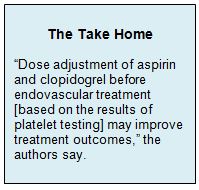Key Points:
- Study compares outcomes of stent-assisted coiling with, without prior testing for platelet responsiveness
- Thrombotic complications, permanent morbidity/mortality lower in tested patients

Babu G Welch, MD, and colleagues at UT Southwestern Medical Center (Dallas, TX) reviewed the Southwestern Tertiary Aneurysm Registry for the period between 2002 and 2012 to identify all 266 patients with unruptured aneurysms treated with stent-assisted coiling. The investigators divided these patients by whether or not they were tested preoperatively for platelet responsiveness to aspirin and clopidogrel using whole blood impedance aggregometry (Chronolog, Havertown, PA).
Overall, 152 patients who underwent 171 procedures had platelet testing and 114 patients who underwent 121 procedures did not. Aspirin nonresponsiveness was detected in 3 patients (1.75%) and clopidogrel nonresponsiveness in 21 patients (12.3%). Where necessary, tested patients received additional doses of antiplatelet drugs to achieve adequate platelet inhibition.
Tested and nontested patients did not differ significantly with respect to age, gender, or aneurysm location. Patients who were not tested, however, had significantly higher rates of thrombolic complications and overall permanent morbidity or mortality than patients who were tested. There was also a non-significant increased rate of hemorrhagic complications among non-tested patients (table 1).
“Aspirin and clopidogrel nonresponsiveness can be responsible for thromboembolic complications in patients undergoing stent-assisted cerebral aneurysm coiling procedures,” write the authors. “While impedance whole blood platelet aggregation is not a point-of-care test, this method has been reliably introduced into a busy neurointerventional practice.”
They conclude that “the assessment of pretreatment platelet reactivity using whole blood impedance aggregometry is a useful and practical means of detecting inadequate antiplatelet drug effects before a neurointerventional procedure.”
Moreover, “modifying the administered dose of clopidogrel and aspirin before a neurointerventional procedure appears to significantly reduce thromboembolic complications and mortality, without increasing the risk of hemorrhage,” the researchers say. “This dose adjustment of aspirin and clopidogrel before endovascular treatment may improve treatment outcomes.”
Source:
- Aoun SG, Welch BG, Pride LG, et al. Contribution of whole platelet aggregometry to the endovascular management of unruptured aneurysms: an institutional experience. J NeuroInterv Surg. 2016;Epub ahead of print.
Disclosures:
- Dr. Welch reports no relevant conflicts of interest


